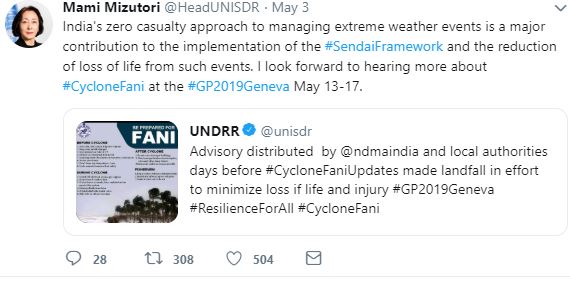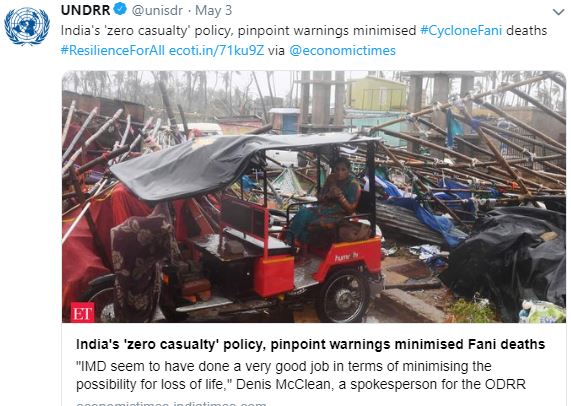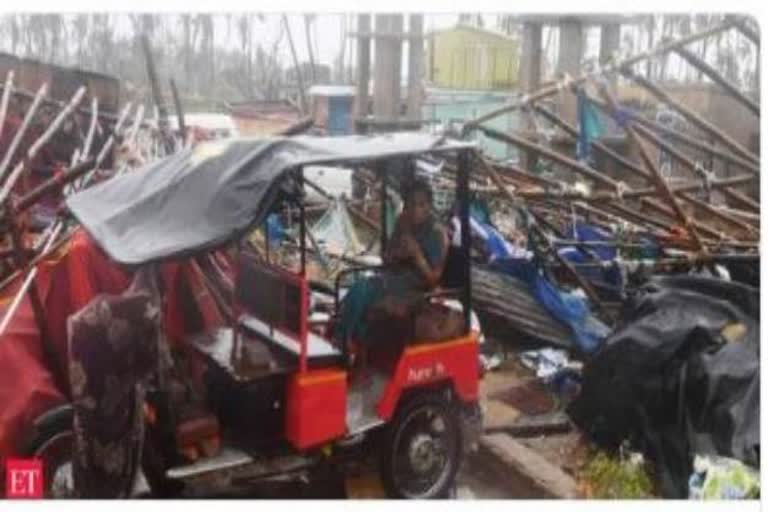वाशिंगटन: संयुक्त राष्ट्र ने चक्रवाती तूफान फानी से हजारों लोगों का जीवन बचाने के लिए भारत की प्रशंसा की है. UN एजेंसी ने कहा है कि भारतीय मौसम विभाग की शुरूवाती चेतावनियों से इस भयानक तूफान से हुए नुकसान को कम किया जा सका.
UN एजेंसी ने भारतीय मौसम विभाग की तारीफ करते हुए कहा कि भारत की सटीक भविष्यवाणी के चलते लोगों को समय पर राहत पहुंचाने में बड़ी मदद मिली.
संयुक्त राष्ट्र कार्यालय के प्रमुख, मामी मिजुटोरी ने कहा चरम मौसम की घटनाओं के प्रबंधन के लिए भारत की जमकर तारीफ की जानी चाहिए. उन्होंने कहा कि भारत ने अपने कौशल से तूफान फानी के असर को कम करने में बड़ी सफलता पाई है

पढ़ें: वेनेजुएला के साथ है अमेरिका, पोम्पिओ ने दिया आश्वासन
भारतीय मौसम विभाग ने फानी को 'अत्यंत भयावह चक्रवाती तूफान की श्रेणी में रखा है. आपको बता दें कि भारत में पिछले 20 साल में आए सबसे भयंकर तूफान ने भारत के पूर्वी राज्य ओडिशा के तट से टकराने के बाद 11 लाख लोगों को प्रभावित किया. फानी के प्रभाव से पुरी,भुवनेश्वर, पारदीप में 175 किलोमीटर प्रति घंटे की रफ्तार से तेज हवाएं चली. इसकी वजह से इन इलाकों में तेज बारिश हुई और समुद्री तटों पर बाढ़ आ गई.
पढ़ें: इंडोनेशिया में बाढ़ से 29 लोगों की मौत, दर्जनों लापता
अधिकारियों ने बताया कि ओडिशा में तबाही मचाने के कुछ घंटों बाद फानी ने मध्यरात्रि में पश्चिम बंगाल में प्रवेश किया. इसके कारण वहां भारि बारिश होने लगी और तूफान में पेड़ उखड़ने लगे. बांग्ला में तूफान का नाम फोनी उच्चारित किया जाता है, जिसका अर्थ सांप का फण है.
संयुक्त राष्ट्र की संस्था ने ट्वीट कर कहा कि भारत की नेशनल डिजास्टर मैनेजमेंट और स्थानीय प्रशासन द्गारा जारी किए गए अलर्ट से फानी के नुकसान को कम करने में मदद मिली.

वहीं फानी से हुई तबाही पर संयुक्त राष्ट्र ने चिंता जताई है और दुनिया का ध्यान जलवायु परिवर्तन की ओर आकर्षित किया है. UN की संस्था UNICEF ने कहा है कि जलवायु में बदलाव का सबसे ज्यादा असर बच्चों पर पड़ रहा है. UNICEF ने आगाह किया है कि प्राकृतिक घटनाएं दुनिया के नेताओं के लिए इस मुद्दे पर सचेत होने का वक्त है.



